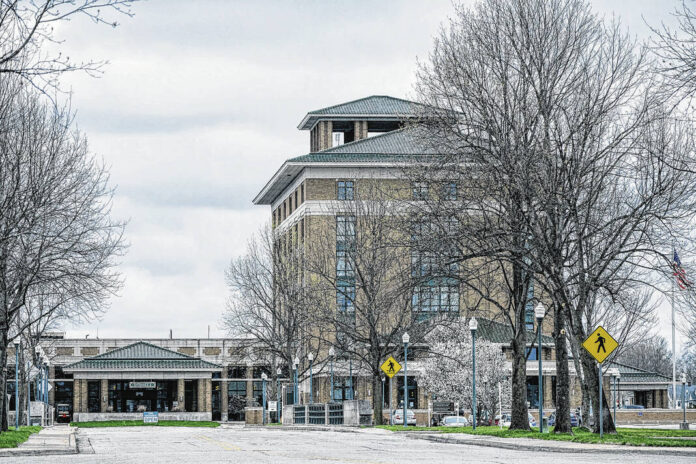
An exterior view of Columbus Regional Hospital in Columbus, Ind., pictured, Tuesday, March 31, 2020. Mike Wolanin | The Republic
An exterior view of Columbus Regional Hospital in Columbus, Ind., pictured, Tuesday, March 31, 2020. Mike Wolanin | The Republic
Local pediatricians say they have seen more cases than usual of a common respiratory illness that can cause breathing problems in babies as the flu season continues to intensify and cases of other respiratory infections increase.
The illness, called respiratory syncytial virus, or RSV, is a common respiratory virus that usually causes mild, cold-like symptoms, according to the Centers for Disease Control and Prevention. While most people recover in a week or two, RSV infections can be serious, especially for infants and older adults.
Among U.S. kids under age 5, RSV typically leads to 58,000 hospitalizations and up to 500 deaths in a year, The Associated Press reported. For adults 65 and older, RSV causes 177,000 hospitalizations and 14,000 deaths yearly.
Cases of RSV fell dramatically two years ago as the pandemic shut down schools, day cares and businesses, according to wire reports. With restrictions easing in the summer of 2021, doctors saw an alarming increase in what is normally a fall and winter virus.
Now, RSV is back again. And doctors are bracing for the possibility that RSV, flu and COVID-19 could combine to stress the health care system, according to wire reports. More than 16,000 tests came back positive for RSV across the country during the week of Nov. 12 — more than in previous surges — “with some regions (of the U.S.) nearing seasonal peak levels,” according to CDC figures.
Locally, cases of RSV in Bartholomew County usually peak in January or February, though local officials have noticed more cases than normal for this point in the year.
“We have seen an increase in RSV cases over the past few weeks compared to what we would normally see in October and November,” said Dr. Tami Stone Iorio, a pediatrician at Northside Pediatrics in Columbus. “RSV season was traditionally roughly October to March, but the peak was usually January to February. We would see only sporadic cases throughout the season until the peak. This year, we see again that over the past couple years of the pandemic, traditional ‘seasons’ for respiratory viruses seem to have shifted and certain viruses are spreading more rapidly in different times of year.”
Columbus Regional Health reported at least a dozen cases of RSV per week from Sept. 17 to Oct. 22 — including 30 cases during the week of Sept. 24 — with cases appearing to peak in late September and early October. CRH reported 10 cases of the illness the week of Nov. 19.
The rise in RSV cases comes as as the U.S. flu season gets off to a fast start, adding to an autumn mix of viruses that have been filling hospitals and doctor waiting rooms, according to wire reports.
The U.S. hospitalization rate for flu hasn’t been this high this early since the 2009 swine flu pandemic, according to the CDC. The U.S. flu season usually peaks in December or January.
Local health officials say they are anticipating that cases of COVID-19, flu and other respiratory viruses will rise in the coming weeks as people spend more time indoors and gather for the holidays.
CRH reported 40 positive flu tests during the first 12 days of November. As of Nov. 12, there had been 2,037 cases of influenza-like illnesses in Indiana, compared to 916 cases at roughly the same point last year, according to the Indiana Department of Health.
As of Nov. 12, the CDC had classified flu activity in Indiana as “high.” State health officials have reported two flu deaths in Indiana so far this season.
“We have also seen an early surge in other, non-RSV respiratory viruses for this time of year,” Stone Iorio said. “For example, there has been more Influenza A than we would normally see in November recently.” CRH also has said flu cases have been “increasingly dramatically over the past few weeks.”
Health officials say that washing hands thoroughly and staying home when sick are good ways of preventing the spread of viruses.
Currently, there’s no specific treatment for RSV, so it’s a matter of managing symptoms and letting the virus run its course. Doctors may prescribe oral steroids or an inhaler to make breathing easier. In serious cases, patients in the hospital may get oxygen, a breathing tube or a ventilator.
There is not yet a vaccine against RSV although some are in development, according to the AP.




